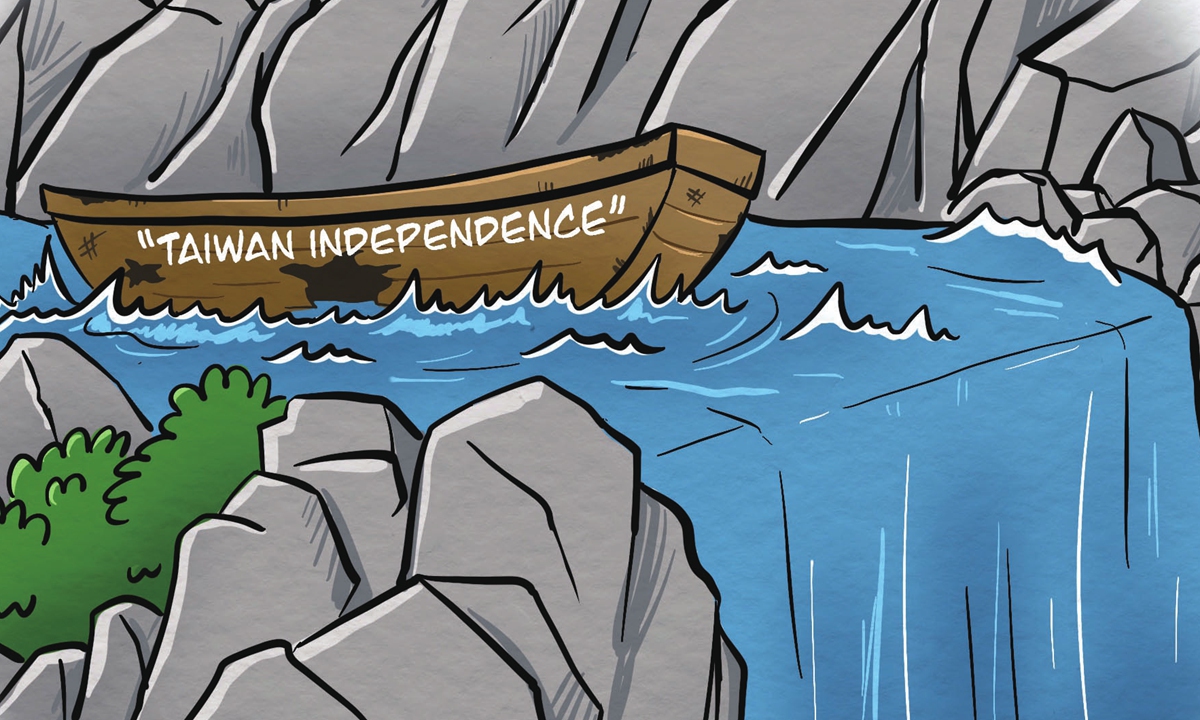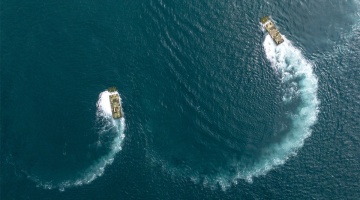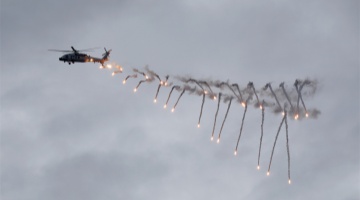
Illustration: Liu Xidan/GT
May 20 marks one full year since Taiwan regional leader Lai Ching-te came to power. This politician, who once called himself a "pragmatic worker for Taiwan independence," has over the past year solidified his image as a "troublemaker," "risk creator," and "war instigator" - ultimately becoming a "pragmatic destroyer of Taiwan." Lai's actions have given the world a clearer view of the ugly truth behind "Taiwan independence" - its attempts to split the country and pander to foreign powers - and have further convinced the outside world that the path of "Taiwan independence" is heading toward a dead end.
Over the past year, Lai's authorities have orchestrated alarming acts of division across the Taiwan Straits. From promoting a new "two states" theory to labeling the Chinese mainland as a "hostile external force" and categorizing Han people - the overwhelming majority on the island - as the "other population"; from forcibly obstructing cross-Straits direct flights, tourism and academic cooperation to politically persecuting local celebrities who support peaceful reunification - this all-encompassing attempt to "de-Sinicize" Taiwan's politics, culture and history is nothing more than a delusional narcotic for the "Taiwan independence" secessionists. It has not only severely damaged the atmosphere for cross-Straits exchanges but also deeply hurt the emotional ties between people on both sides of the Straits.
Recent public opinion polls on the island show that Lai's approval ratings have plummeted, marking the "worst anniversary reputation," which isn't surprising. Recent polls released by Taiwan's United Daily News and TVBS show that over 50 percent of respondents are dissatisfied with Lai authorities, while only around 30 percent express satisfaction. Moreover, the surveys reveal that 43 percent of the island's residents believe Taiwan has become more dangerous after Lai came into office, and 52 percent think society has become more divided. A Kuomintang (KMT) member concluded that "aside from his core base of die-hard supporters, Lai is facing opposition and challenges from nearly every direction."
This reflects the true sentiment of the public on the island.
From constructing the so-called "17 major strategies" of Lai's "green terror" to blatantly eliminating dissent and aggressively undermining the blue and white political camps through the so-called Great Recall Campaign... Lai's "new policies" have created greater insecurity and uncertainty for the people of Taiwan. Beneath the facade of the so-called "democracy and freedom" lies the DPP authoritarian essence of "those who obey thrive, those who resist perish." This kind of "green terror" not only runs counter to the mainstream public desire for peace, development, and stability, but has also plunged the Taiwan society into endless political infighting.
When it comes to economic and livelihood issues that concern the public most, the DPP authorities not only lack meaningful accomplishments, but in some areas, they even fail to meet basic standards. Over the past year, problems such as shortages of water, electricity, land, labor, and talent have become more severe. Polls show that 72 percent of the public is worried about the stability of the power supply. As one resident put it in an interview with United Daily News: "What position does a government that can't even ensure stable electricity for its people have to talk about reform or trust?"
The Lai authorities have taken more dangerous steps in their strategy of "soliciting external support for Taiwan independence."
On one hand, they have significantly increased the defense budget, aggressively purchasing military equipment from the US, continuously fabricating false narratives about a "mainland invasion of Taiwan," and forcing the people on the island to accept the gangland storyline of "paying protection money." On the other hand, they have made limitless compromises and concessions to hegemonic bullying on issues such as tariffs, even going so far as to offer up the "guardian mountain" TSMC to the US. Their manipulation of Taiwan's participation in the World Health Assembly as an "observer," in collaboration with the US "Democratic Alliance," and promotion of the so-called "non-red supply chain," ultimately resulted in the World Health Assembly rejecting Taiwan-related proposals for nine consecutive years.
The US magazine Foreign Policy sharply pointed out that Lai's "salami-slicing independence" is placing Taiwan at risk of war. A German media outlet summarized the current situation of the Lai authorities as "trapped in internal and external difficulties." A report released by a Hong Kong youth think tank shows that the risks in cross-Straits relations in 2025 have reached a new high compared to a year ago, with "extreme internal politics in Taiwan being the core factor driving the rise in the risk index." History has long proven that any separatist act relying on foreign support only serves as a pawn in the hegemonic chess game, ultimately unable to escape the fate of being abandoned.
From Lai's actions over the past year, we can see the reckless rush toward the dead end of "Taiwan independence," as well as the inevitable failure of "Taiwan independence." The facts prove that the separatism of "Taiwan independence" is incompatible with peace in the Taiwan Straits, and that confrontation and opposition are contrary to communication and dialogue. Maintaining a stance of "Taiwan independence," "soliciting external support for Taiwan independence," and "seeking independence through military buildup" leads nowhere. We advise Lai and the DPP authorities to prioritize the welfare of the people on the island, thoroughly recognize the realities and trends in the Taiwan Straits, cease any provocative actions or rhetoric seeking "independence," and stop pursuing the wrong path.













